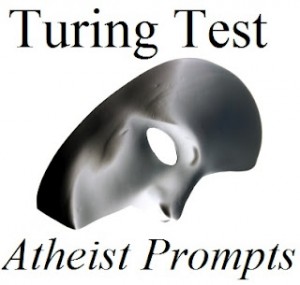This is the tenth entry in the Atheism round of the 2012 Ideological Turing Test for Religion. In this round, the honest answers of atheists are mixed in with Christians’ best efforts to talk like atheists. It’s your job to see if you can spot the difference. The voting link appears at the end of the entry, and you can look at all entries in this round here.
When (if ever) have you deferred to your philosophical or theological system over your intuitions?
Intuition is a tool for generating useful heuristics. It’s formed by experience and by deep thinking about particular examples to inform the brain’s pattern-recognition software. One consequence of this understanding is that in unfamiliar situations, intuition’s results needs to be checked against deeper principles and reshaped if intuition is giving bad answers.
A good example, and one where I had to work for some time to form my intuition, is the idea that the universe needed an entity (God) to cause it. Intuitively, everything in the universe has a cause, so the universe needs a cause. However, if A caused B, then A had to precede B; time is a property of the universe, so nothing can precede the first instant in time, so nothing can have caused the universe.
That doesn’t make intuitive sense, but it’s sound logic, so I had to reshape my intuition. The universe is a four-dimensional space with time and space coordinates, so I looked at a common two-dimensional space and thought about its coordinates. Asking, “What caused the big bang?” is tantamount to asking, “What’s north of the north pole?”
The point is that the truth is often counterintuitive. When that’s the case, intuition has to be shaped by actively thought-through philosophy, not the other way around.
Are there people whose opinions on morality you trust more than your own? How do you recognize them? How is trusting them different than trusting someone’s opinion on physics?
First, there’s a fundamental is-ought difference between trusting an authority on physics and an authority on morality.
Second, I know I can (more or less) trust academic authorities on physics because I understand how the incentives of academics face interact with the scientific method, and because basic physics, the physics I understand, works, so I am more likely to trust the authorities which taught me that physics.
On morality, since there’s no objective moral standard by which different moral theories can be measured (see the first point), there can’t be any process by which moral theories can be measured, discarded, or improved. So to the extent to which I believe morality can be codified, I am willing to listen to moral philosophers. Their function, however, is not as moral *authorities*, but instead to introduce me to new arguments which I might or might not incorporate into my own semi-utilitarian morality. (NB: this doesn’t strongly impact my moral practice, which is to follow a set of simple heuristics like “don’t be a dick”.)
So as far as what’s abstractly “right” and “wrong,” I don’t really trust anybody more than myself.
Can you name any works of art (interpreted pretty broadly: books, music, plays, poetry, mathematical proofs, etc) which really capture the way you see life/fill you with a sense of awe and wonder? You can give a short explanation or just list a few pieces.
I don’t frequently look for self-reflection in art. When it comes to art appreciation, I find I am a Wildean aesthete, not a Romantic looking for meaning, so it’s difficult for me to put together a list of works of art that capture how I see life. This was true even when I was religious, so this section probably isn’t going to be too much different from the other half of this Turing test.
Anyway, please forgive the paucity of this list.
“Art” that induces awe or wonder or strong emotional stirring:
- 2nd movement of the Eroica
- Banach-Tarski paradox
- Mandelbrot set and its Julia set
- The first half-hour of the Easter vigil mass, especially the lighting of candles
Other activities that induce a sense of wonder:
- Gazing up at a clear night sky. (I have recently become aware of the day-to-day movement of the Moon and planets, probably because I’ve been walking to work more. I love to think about emergent order in the universe.)
- Looking at how diverse and teeming life is and imagining the coursing of evolution through deep time
- Thinking about the macroeconomy and widespread voluntary coordination emerging from the price mechanism
Click here to judge this entry, and, once you’ve voted, feel free to speculate and trade theories in the comments or look at other entries in this round.












